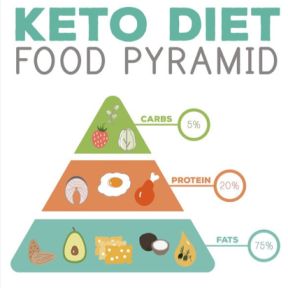The keto diet was designed for epilepsy. Back in the 1920s, doctors realised that keeping their patients on a low-carb diet forced their bodies to use high amounts of fat as a source of fuel instead of glucose.
When only fats are available for the body to burn, the fat present in the body turns into fatty acids and then breaks into compounds called “ketones,” which can be used as fuel for the body cells.
For many reasons not yet understood, fueling the body entirely on ketones reduces seizures, which is why patients suffering from epilepsy rely on ketogenic diets today. But some people who cannot respond to anti-seizure medications can still benefit from this diet.
What Exactly Is The Keto Diet?
A keto diet forces the body into a state called ketosis, meaning that all body cells are dependent on ketones for energy.
It is still not clear how this works in weight loss and correcting other health issues, but studies state that one possible reason could be keeping the body full and preventing further calorie intake by consuming high amounts of fat and moderate amounts of proteins.
What Can Be Consumed On A Keto Diet?
Keto is all about high fats, moderate protein, and low carbs.

Following are the food items that need to be included if you want to be on the keto diet:
- Oils (olive oil, coconut oil, and even avocado oil). Provides healthy fats and is a good source of antioxidants as well.
- Coconut (not sweetened)
- Nuts (almonds and macadamia)
- Seeds (chia, flaxseed, and sunflower seeds)
- Avocados are a good source of fibre and fat and contain significant amounts of potassium, which is a must-consume mineral when on a keto diet.
- Non-starchy vegetables (zucchini, cucumber, broccoli, cauliflower, bell peppers, spinach, kale, and asparagus)
- Meat and poultry: Choose lean cuts of meat, such as chicken breast or fish, and avoid processed meats, such as bacon or sausage, which are high in unhealthy fats.
- Fish, especially fatty fish such as salmon and sardines
- Eggs: do not skip the yolks.
- Full-fat dairy, as they are rich in fat and low in carbohydrates.
Recommended Article: Veganism- How are Indians adapting to this diet?
Food Items to Avoid in a Keto Diet
You absolutely cannot erase carbs from your diet completely, and it is not even suggested. But while following a keto diet, carbohydrate items demand your specific attention for recognising them and eliminating them from your plate, which includes the following:
- Fruits, especially bananas, grapes, apples, and oranges
- Grains
- Starchy vegetables like potatoes, corn, yams, peas, and carrots
- Cold cuts (precooked or cured meats)
- Sugary drinks like juices, soda, energy drinks, and every kind of carbonated beverage
- Processed and packaged foods
- Milk and ice cream
- Alcohol
- Desserts, including sweets, bakery, and confectionery items
Should You Try the Keto Diet?
It is important to note that the ketogenic diet is a high-fat, low-carbohydrate diet that can be difficult to follow.
The keto diet is not suggested for people with special nutrient requirements, diseases, or any other form of medical condition.
Malnourishment and therapeutic states bring in a lot of complexity, because of which such diets are not encouraged, since in the case of slight deviation or negligence, a huge health hazard can arise, which is not worth the risk for a tiny advantage that is not even guaranteed.
People Who Should Avoid the Keto Diet
Experts believe that opting for the keto diet could be risky for the following groups:
1. People with Type 1 Diabetes
As the keto diet might decrease blood sugar to a life-threatening level for these people with type 1 diabetes because they are insulin-dependent, they are encouraged not to follow this diet type.
2. People with Eating Disorders
Going on such a rigid diet that removes key food groups might induce a relapse if you have a personal history of eating problems.
3. People who have had their gallbladders removed
As the gallbladder holds bile, which assists in fat digestion, without this organ, you might not feel healthier on this high-fat diet.
4. People with Thyroid illness
A keto diet may lower the levels of thyroid hormones, says Audrey Fleck, an integrative and functional dietitian and a certified diabetes educator in Perkasie, Pennsylvania.
5 People with Multiple Sclerosis
There might be probable negative effects for people with multiple sclerosis, such as fatigue and constipation; thus, it does not promise long-term safety.
Recommended Article: Processed Foods: Unveiling the Hidden Dangers Behind
What is the Attractiveness of the Keto Diet?
Weight loss:
The keto diet is an extremely efficient approach to reducing weight. Studies have demonstrated that those who practise the keto diet are capable of losing more pounds than people who practise other types of diets.
Improved health:
The keto diet has been demonstrated to treat several health issues, including coronary artery disease, type 2 diabetes, and epilepsy.
More energy:
People who follow the keto diet generally claim to have greater stamina than they did before starting the keto diet.
Increased mental clarity:
People who follow the keto diet generally claim to have more focus and mental clarity than they did before they started the diet.
Weight loss? Is this the only way?
Yes, it can make you lose weight. But is it worth risking your health? Read about the possible side effects to decide for yourself.
- Dehydration, resulting from increased urination Because of this, more water intake is recommended during the keto journey.
- Kidney stones form because of high acid production in the body.
- Nutrient deficiencies in cases of inadequate food intake and incorrect meal planning. There are special requirements for vitamin C, magnesium, and potassium while following the keto diet.
- Keto flu occurs with a set of symptoms including nausea, indigestion, constipation, diarrhoea, and fatigue. It arises as a result of the body’s adjustment to burning fat for fuel instead of carbohydrates.
- Cardiovascular disease may happen if a lot of saturated fats are consumed, as they raise bad cholesterol, i.e., LDL.
No! The keto diet is not the only way to lose weight.
Follow a diet plan that is designed sustainably for you.
Keep in mind that a healthy diet plan comprises an adequate proportion of macro- and micronutrients that support your overall health. Do not forget to emphasise physical activity and mental health as well.
If you are convinced to try this diet, to be on the safe side, be very sure to consult a dietitian to get yourself assessed for the suitability of this diet and get a personalised diet plan tailored as per your needs.
Recommended Article: Collagen Diet: 9 Best Foods To Boost Your Body’s Collagen Levels
Be careful!

Keto diets are probably more prone to ending up regaining weight because it is really hard to stick to such a hard diet in the long run.
Also, doing it for more than a few weeks can be deleterious for your health, overpowering the benefits achieved.
Ketogenic diets also cause a loss of calcium that passes out of the body through urination, which can be lethal for bones, causing low density and ultimately increasing the risk of osteoporosis.
The AHA recommends eating a variety of fresh fruits and vegetables, whole grains, low-fat dairy products, skinless poultry, nuts, and legumes, and limiting the consumption of red meat, saturated fats, and sweets for a heart-healthy diet.
As the ingestion of fruits is a huge no-no in this diet and very few vegetables can be consumed, this limits antioxidant intake, resulting in greater risks of free radical formation in the body.
At least 150 minutes of workouts or any sort of physical activity per week are recommended to maintain a balanced lifestyle and optimal health.
Weight reduction and maintaining that weight could demand more energy in the form of activities, which would not be achievable with keto diets as ketones as fuel for the body cells won’t be able to provide much energy to be physically active.
Individuals often desire to lose weight, primarily fat but not body mass, which largely contains muscles, and like other fad diets, individuals typically regain the weight as they go off the keto diet.
Indians and the Keto Diet
The keto diet is gaining popularity in India, with many people trying it to lose weight quickly. However, before starting this diet, it’s essential to assess whether it suits your body’s needs and to seek advice from qualified dietitians. It’s equally important to focus on consuming the right fats, which are crucial for proper body function. Being informed about the diet and following it under the guidance of an experienced professional or doctor is vital for safety. For additional advice and real-life experiences, exploring a keto blog can provide valuable insights as you consider this diet.
Tips for Adopting a Ketogenic Diet
- Start slowly. Avoid modifying your diet too much all of a sudden. Start by making simple modifications, such as eating non-starchy veggies and healthy fats.
- Track your progress. This can keep you motivated and make sure you are receiving adequate nutrition.
- Be prepared. It might be challenging to locate keto-friendly items at cafes or when eating out. Be prepared by bringing your meals or discovering keto-friendly eateries.
Before going keto, weigh the benefits and drawbacks.
The ketogenic diet can be a safe and effective method to lose weight and enhance your health. However, it is vital to consult your medical professional before adopting a ketogenic diet, particularly if you have any medical conditions.
Losing weight can appear difficult, but it is feasible with effort and determination. Remember to be patient with yourself and to concentrate on making little improvements at a time. You may achieve your weight loss goals with time and effort.
Do not get carried away with fad diets to lose weight quickly, since this will only be temporary.
Also Read: 5 Mouthwatering Keto Recipes for a Low-Carb Feast









